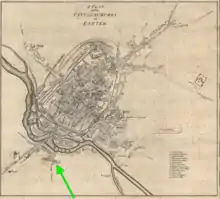
Floyer Hayes shown on a 1765 map of the City of Exeter, Devon, by Benjamin Donn. Many open spaces around the outside of the City walls are shown as suffixed "Hay", such as Shill Hay, Southern Hay, Northern Hay, Fryers Hay, Bon Hay
-hay (also hays, hayes, etc.) is a place-name word-ending common in England. It derives from the Old English word hege[1] or haga,[2] Middle English heie,[3] in Icelandic hagi,[4] meaning "an enclosed field", and is from the same root as the English word "hedge", a structure which surrounds and encloses an area of land,[5] from the Norman-French haie, "a hedge".[6] Haw (from O.E. haga) and Hay (from O.E. hege) are cognate and both mean "hedge".[7]
Examples
- Cheslyn Hay, Walsall, meaning "a fenced or hedged enclosure", here perhaps around an ancient cromlech or burial-mound.[8]
- Pipe Hayes ("hedges"), Erdington.[9]
Derbyshire
In the vicinity of Derbyshire:
- Floyer Hayes
- Cotmanhay
- Idridgehay
- Lower Hartshay
- Marehay
- Parsley Hay
- The Findern Hays
- Upper Hartshay
Devon
Exeter
In the vicinity of Exeter:
- Floyer Hayes
- Northern Hay
- Southern Hay
- Shill Hay
- Fryers Hay
- Bon Hay
- Princesshay
Tiverton
In the vicinity of Tiverton:
- Moor Hayes, Cullompton
- Passmore Hayes
- Buck Hayes
- Rashleigh Hayes
- Gorn Hay
- Wid Hayes
- Moor Hayes, Washfield
See also
- Hayes (surname), sometimes derived from this topological source
Sources
References
This article is issued from Wikipedia. The text is licensed under Creative Commons - Attribution - Sharealike. Additional terms may apply for the media files.